A choice of crime novels
Andrew Taylor Natasha Cooper's heroine, Trish Maguire, is a barrister who subverts the stereotypes, an outsider whose troubled background sometimes gives her more in common with clients than colleagues. At the start of A Greater Evil (Simon & Schuster, £17.99), the latest novel in the series, Trish's private life is on a relatively even keel. At work, her attention is on a complex insurance case involving the Arrow, an elegant addition to the City's skyline which is developing some unexpected cracks. The opposing team includes a heavily pregnant friend, Cecilia. Then Cecilia is brutally attacked in the studio of her sculptor husband Sam. Her baby is born prematurely as she dies. Sam, who has a history of violence, is the police's prime suspect. Trish has a professional connection with the sculptor, once an abused and abandoned child. A woman charged with the murder of her baby is claiming to be Sam's birth mother and is desperate to get in touch with him To add to Trish's problems, the officer investigating Cecilia's murder is one of her closest friends — a desperately ambitious woman inclined to interpret Trish's support of Sam as personal treachery.
Cooper is a first-class crime novelist. The narrative of this powerful and densely plotted novel is driven by her sense of injustice, and by her empathy for the vulnerable who so often become victims. She is particularly good on the brutal Byzantine intrigues of office politics and the hidden machinery of the legal system. All in all, this is a strong addition to a series that grows steadily more impressive.
Ann Cleeves, winner of last year's inaugural Duncan Lawrie Dagger, is another fine author with a strong, credible female protagonist. Detective Inspector Vera Stanhope, a heavy-drinking, lumbering loner marooned in middle age, bears little outward resemblance to the traditionally fit and feisty feminist detective who is such a familiar figure in the contemporary crime novel. Hidden Depths (Macmillan, £12.99), the third title in the series, centres round two murders near Newcastle. A mother finds her son, a teenager with learning difficulties, strangled in the bath, with wild flowers floating around his body. Soon afterwards, an attractive student teacher is found dead in a rock pool, and there are flowers around her too.
Cleeves' particular skill is characterisation. Her characters range from affluent students to a spoiled woman filled with diffused sexual yearnings, from nurses to academics, from painfully doting parents to a group of middle-aged bird-watchers, all with their own secrets. It's a dark, interesting novel with considerable emotional force behind it.
One of the pleasures of translated crime fiction is that it so often fails to follow the conventions of its Anglo-American cousins. The Scent of the Night (Picador, £12.99) is the sixth of Andrea Camilleri's Inspector Montalbano novels to appear in English translation. Montalbano, a Sicilian, is interested in the pursuit and consumption of food, followed by detection and women (usually in that order). A financial adviser disappears, together with his clients' savings. Is he living in luxury in the South Seas? Has the Mafia got him? Where is his young colleague? And why is the colleague's uncle building a house on the site of Montalbano's favourite olive tree? Other ingredients include a gunman with Parkinson's, a lovelorn secretary, a vindictive police commissioner, and a short story by William Faulkner that mysteriously comes to life.
This off-beat crime novel can't have been easy to translate — some of the attempts to render Sicilian dialect are fatally reminiscent of Dick Van Dyke's memorable performance as a cockney in Many Poppins. But astringent touches provide an agreeable contrast to the cosy unreality of the storyline. The book offers a glimpse of a wholly different way of living. Crime and punishment may be universal, but in Sicily they have a different flavour.
Barbara Nadel's A Passion for Killing (Headline Review, £19.99) is set in Istanbul and features her series detective, Inspector Cain Ikmen. The plot involves a suspected serial killer, the sexual adventures of a British diplomat's wife, the Turkish secret service, the economics of carpet dealing, a poverty-stricken family of Ottoman grandees and a blood-stained Kerman carpet that T. E. Lawrence is reputed to have liberated from a Turkish train. The novel comes complete with a map, a glossary and appendices on carpets, Lawrence, and the decline of the Ottoman empire.
The strength of this book is its setting. Nadel makes full use of the rich variety of possibilities offered by modern Istanbul and its inhabitants. She's fascinating on the details of the carpet trade, too. Crime fiction can do many things, and here it offers both a well-crafted mystery and a form of armchair tourism, with Nadel as an expert guide.














































 Previous page
Previous page